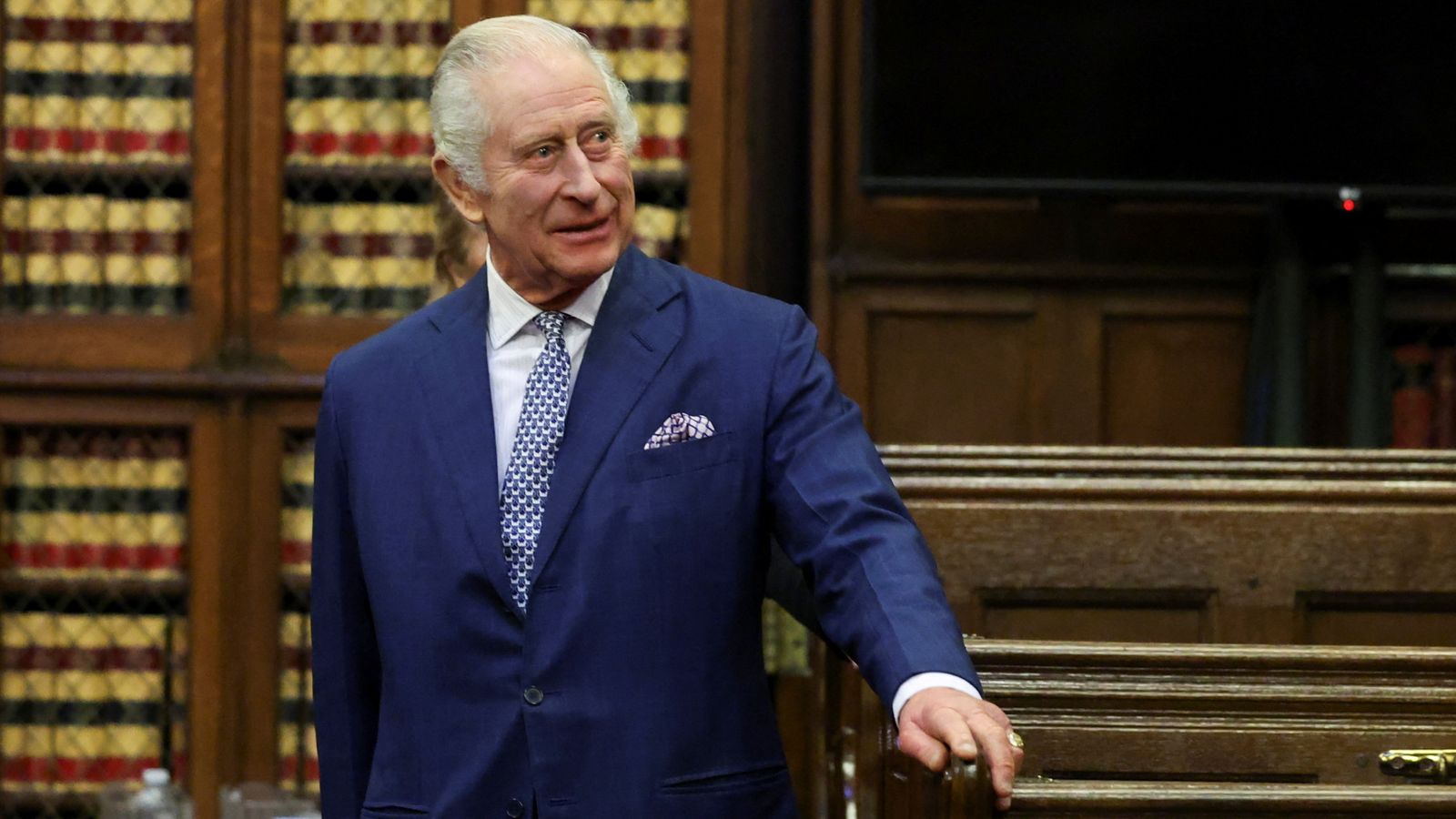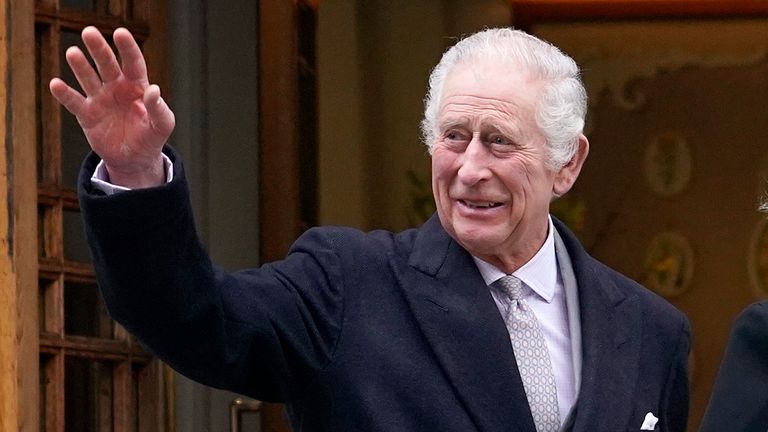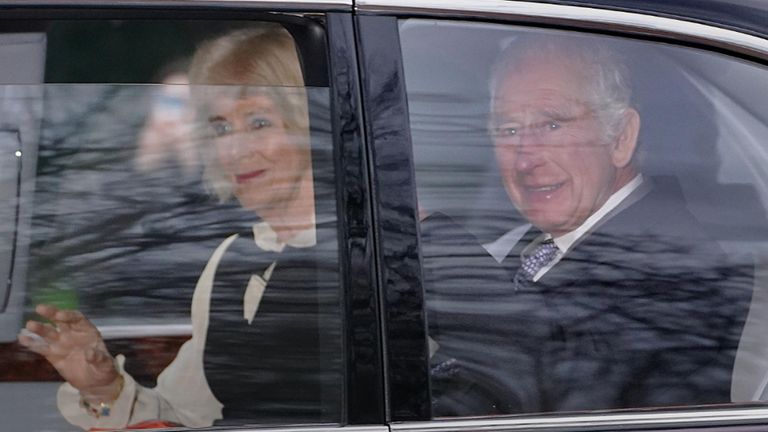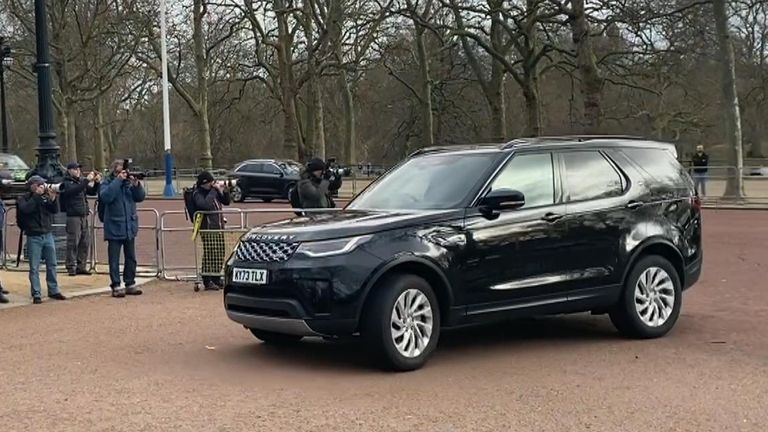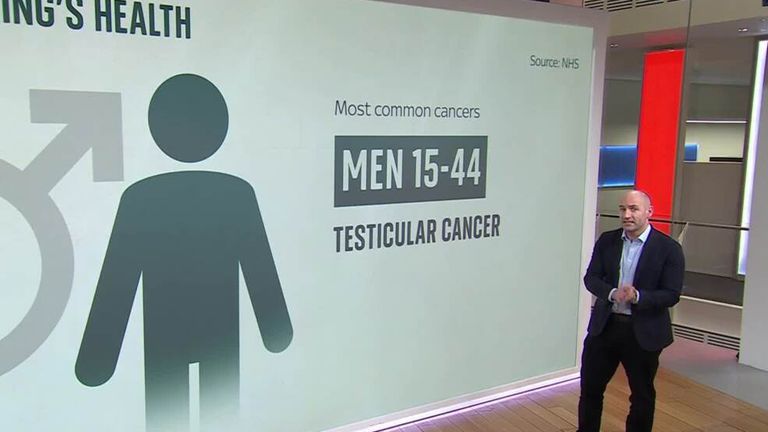The King is undergoing treatment after being diagnosed with cancer.
The palace said the condition was discovered while the monarch was being treated in hospital for an enlarged prostate – but they have said it is not prostate cancer.
But whose job is it to keep the monarchy fit and healthy?
The King “famously doesn’t have lunch”, and is “particular about his food”. He has also been open about his support for complementary therapies in the past.
Here’s a look inside his top medical team.
Who is in the King’s medical team?
“The King always travels with his GP, Dr Michael Dixon, the current head of the Royal Medical Household,” says Laura Bundock, Sky News’ royal correspondent.
“Dr Dixon is a supporter of complementary medicine and alternative therapy, as is the King,” she says.
Complementary medicine is a non-mainstream practice used together with conventional treatments – whereas alterative medicine is used instead of conventional treatment.
The Royal Medical Household is a round-the-clock team of medical staff, and is led by Dr Dixon, who worked in the NHS for almost 50 years before King Charles gave him the role in 2022.
The King was criticised for hiring Dr Dixon by academics and campaigners, who claimed it was “inappropriate” considering the doctor’s open support for faith healing and herbalism.
The Sunday Times reported last year that Dr Dixon once invited a Christian healer to his surgery to treat chronically ill patients, prescribed an African shrub for shoulder pain and goat weed for impotence.
He also helped develop a health initiative by the Prince’s Foundation In October last year, which promoted playing the bagpipes to improve certain lung conditions and breathing difficulties.
A statement from Buckingham Palace in response to the controversy read: “Dr Dixon does not believe homeopathy can cure cancer.
“His position is that complementary therapies can sit alongside conventional treatments, provided they are safe, appropriate and evidence based.”
He is head of the medical household, but is not thought to be the monarch’s physician, according to The Guardian. Details of the team are not listed publicly.
Click to subscribe to the Sky News Daily wherever you get your podcasts
Ranan Dasgupta, based at The London Clinic, was the King’s Serjeant Surgeon – the senior surgeon in the royal medical household – when he received treatment for an enlarged prostate last month, according to the Press Association.
The Cambridge University graduate is a urological surgeon who specialises in specific forms of treatment for an enlarged prostate.
Supporting complementary medicines
The King’s hiring of long-time friend Dr Dixon may have been controversial, but it wasn’t entirely unexpected, as he had already made his beliefs in complementary medicine clear, having openly supported its use in the NHS.
In 2004, Michael Baum, a professor emeritus of surgery and visiting professor of medical humanities, wrote an open letter to the then Prince of Wales in a BMJ issue titled: With respect, your Highness, you’ve got it wrong.
Prof Baum accused the King of “promoting unproven cures for cancer” after he became the British Medical Association’s president in 1982.
He said he was incensed to write the letter after seeing the Observer and Daily Express report that the then prince was “promoting coffee enemas and carrot juice for cancer”, adding: “I do beg you to exercise your power with extreme caution when advising patients with life-threatening diseases to embrace unproven therapies.”
The former prince later lobbied for complementary medicine in one of his infamous Black Spider letters.
In a letter to then health secretary Alan Johnson in 2007, he called for homeopathic hospitals – specifically the Tunbridge Wells Homeopathic Hospital – to be safeguarded. It ultimately closed in 2009.
He wrote: “As I said to you during our meeting, the only reasons I persist in my efforts over integrated healthcare – despite waves of invective over the years from parts of the Medical and Scientific Establishments – is because I cannot bear people suffering unnecessarily when a complementary approach could make a real difference.”
His beliefs were further publicised when he became a patron of the Faculty of Homeopathy (FoH) in 2019.
Edzard Ernst, an emeritus professor at the University of Exeter who specialises in alternative and complementary medicine, said the appointment showed the then prince was a “promoter of quackery” and “an enemy of progress in healthcare”.
Buckingham Palace has not shared any details of the King’s treatment plan and it has not been revealed which, if any, complementary therapies the King might be having.
How does the King stay healthy?
The King famously doesn’t eat lunch and is reportedly particular when it comes to his food, says Sky News’ royal correspondent, Laura Bundock.
“He is a long-time campaigner for sustainability and organic farming, and has spoken about following a diet which reduces his carbon footprint,” she explains.
“He once described how he doesn’t eat meat or fish two days a week, and goes dairy free once a week.
“Perhaps only a few have shared a breakfast table with him, but in the mornings he’s said to enjoy helpings of nuts and seeds. He is also a fan of eggs, and keeps bees so honey’s another popular choice.”
Waiting times for NHS diagnosis and treatment
It isn’t clear if King Charles will be treated on the NHS or receive private healthcare.
NHS England has targets it aims to meet for both diagnosis and treatment waiting times. It aims to:
• Either diagnose or rule out cancer within 28 days of an urgent GP referral
• Begin treatment within 31 days after a patient’s cancer has been found and a decision has been made to treat them
• Patients should wait no longer than 62 days between the date the hospital receives an urgent suspected cancer referral and the start of treatment
Knowing that it is unlikely to deliver this timeframe for all patients, the NHS introduced percentage targets in April 2021.
But these targets are frequently missed.
The latest NHS England figures, from November 2023, show 71.9% of patients urgently referred for suspected cancer were diagnosed or had cancer ruled out within 28 days, below the target of 75%.
The proportion of patients in England waiting longer than 62 days in November from an urgent suspected cancer referral to have their first treatment was 65.2%.
Read more:
King Charles’s cancer diagnosis: What we know so far
Full statement as palace reveals monarch having treatment
This was up from 63.1% in October but well below the 85% target.
The figures show that 90.1% of people were treated within 31 days after their cancer has been found and a decision has been made to treat them, missing the target of 96%.
How does this compare to private healthcare?
You can pay for private treatment when diagnosed with cancer, with costs usually reaching thousands of pounds.
This can be provided through a private hospital like The London Clinic, where the King was treated for an enlarged prostate, or through a private service at an NHS hospital.
When patients choose to go private, it’s often because they might be able to see a specialist sooner, says Cancer Research UK.
Other common reasons include:
• The possibility of choosing your own specialist or hospital
• The chance to access different types of treatment or a treatment that isn’t available through free healthcare
• Wanting to get a second opinion
You can self-fund the treatment, or you might be covered if you pay for private health insurance.
The patient’s specialist outlines how much treatment costs from the outset, but there may be some unpredictable added costs, like if the patient becomes unwell and needs other treatments to help.
You’re still entitled to free NHS care if you go private, but for non-emergency complications that arise from the private treatment, the patient usually has to go through the private healthcare provider.
Does the Royal Family use private healthcare?
The fact that they are regularly treated at private hospitals suggests that they do.
The Princess of Wales was also at The London Clinic last month for abdominal surgery, which she is now recovering from at home.
The royals have also regularly used the King Edward VII private hospital in Marylebone and Princess Anne, Princess Diana, and the latest Princess of Wales gave birth at The Lindo Wing at St Mary’s Hospital, which has a private maternity ward.
The family, of course, have more reason than most to be cautious over their privacy.
They are also regular champions for the NHS. King Charles and Queen Camilla toured the Royal Infirmary of Edinburgh to mark its 75th anniversary in July last year.
link

